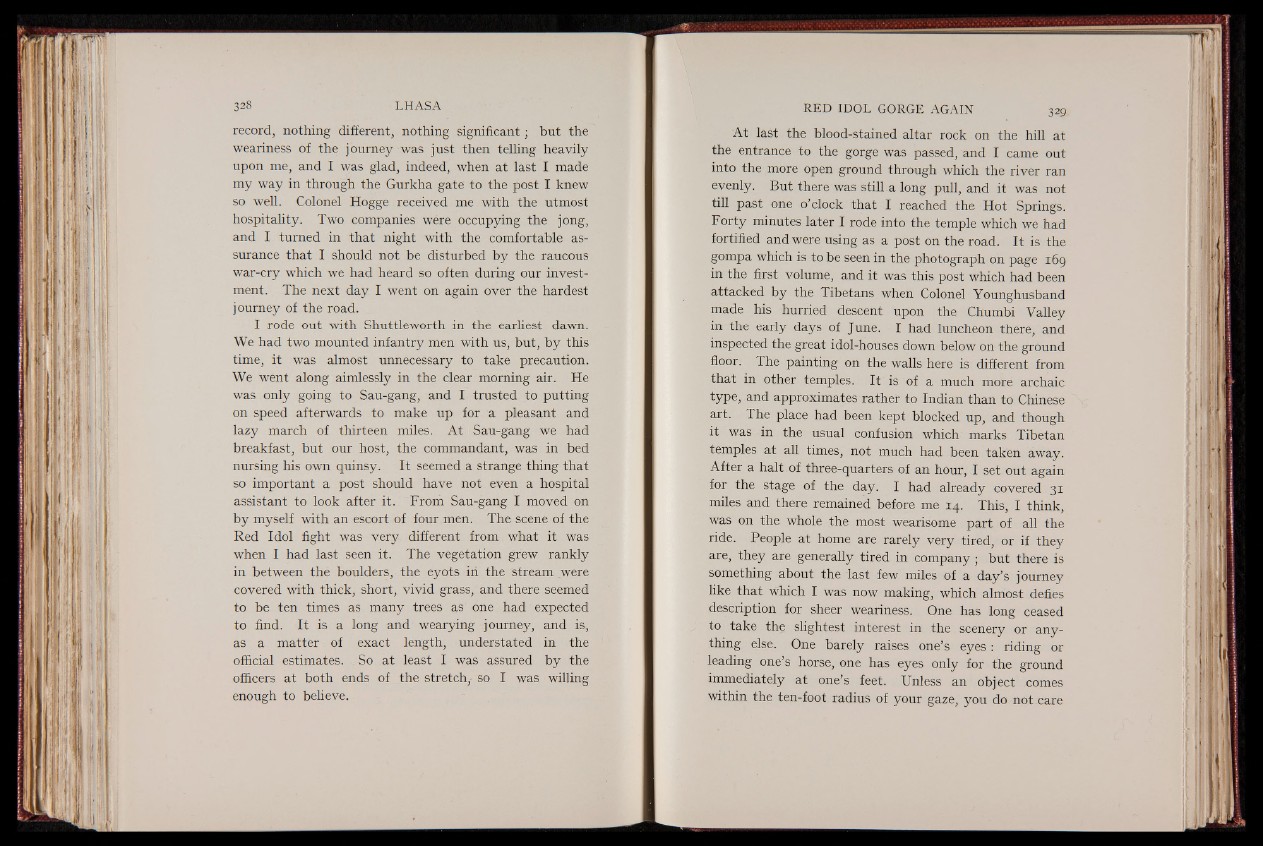
record, nothing different, nothing significant; but the
weariness of the journey was just then telling heavily
upon me, and I was glad, indeed, when at last I made
my way in through the Gurkha gate to the post I knew
so well. Colonel Hogge received me with the utmost
hospitality. Two companies were occupying the jong,
and I turned in that night with the comfortable assurance
that I should not be disturbed by the raucous
war-cry which we had heard so often during our investment.
The next day I went on again over the hardest
journey of the road.
I rode out with Shuttleworth in the earliest dawn.
We had two mounted infantry men with us, but, by this
time, it was almost unnecessary to take precaution.
We went along aimlessly in the clear morning air. He
was only going to Sau-gang, and I trusted to putting
on speed afterwards to make up for a pleasant and
lazy march of thirteen miles. At Sau-gang we had
breakfast, but our host, the commandant, was in bed
nursing his own quinsy. It seemed a strange thing that
so important a post should have not even a hospital
assistant to look after it. From Sau-gang I moved on
by myself with an escort of four men. The scene of the
Red Idol fight was very different from what it was
when I had last seen it. The vegetation grew rankly
in between the boulders, the eyots in the stream were
covered with thick, short, vivid grass, and there seemed
to be ten times as many trees as one had expected
to find. It is a long and wearying journey, and is,
as a matter of exact length, understated in the
official estimates. So. at least I was assured by the
officers at both ends of the stretch, so I was willing
enough to believe.
At last the blood-stained altar rock on the hill at
the entrance to the gorge was passed, and I came out
into the more open ground through which the river ran
evenly. But there was still, a long pull, and it was not
till past one o’clock that I reached the Hot Springs.
Forty minutes later I rode into the temple which we had
fortified and were using as a post on the road. It is the
gompa which is to be seen in the photograph on page 169
in the first volume, and it was this post which had been
attacked by the Tibetans when Colonel Younghusband
made his hurried descent upon the Chumbi Valley
in the early days of June. I had luncheon there, and
inspected the great idol-houses down below on the ground
floor. The painting on the walls here is different from
that in other temples. It is of a much more archaic
type, and approximates rather to Indian than to Chinese
art. The place had been kept blocked up, and though
it was in the usual confusion which marks Tibetan
temples at all times, not much had been taken away.
After a halt , of three-quarters of an hour, I set out again
for the stage of the day. I had already covered 31
miles and there remained before me 14. This, I think,
was on the whole the most wearisome part of all the
ride. People at home are rarely very tired, or if they
are, they are generally tired in company; but there is
something about the last few miles of a day’s journey
like that which I was now making, which almost defies
description for sheer weariness. One has long ceased
to take the slightest interest in the scenery or anything
else. One barely raises one’s eyes : riding or
leading one’s horse, one has eyes only for the ground
immediately at one’s feet. Unless an object comes
within the ten-foot radius of your gaze, you do not care